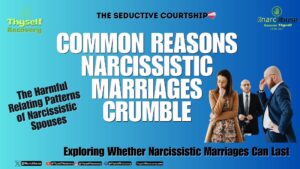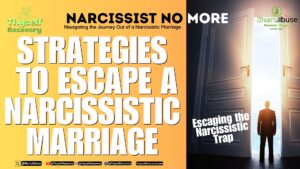The Rapid Rebound: Understanding the Timeline of When and Why Narcissists Start New Marriages Post-Divorce
The Narcissist’s Initial Marriage Pursuit
When courting new partners, narcissists often utilize tactics like:
Love Bombing
Lavishing their target with flattery, gifts, constant contact to quickly secure their affection.
Mirroring
Imitating the target’s interests, values, goals to create false chemistry and compatibility.
Future Faking
Making romantic promises about their future together like marriage, children, etc.
Idealization
Portraying themselves and the new relationship in an unrealistically perfect, idealized light.
Why Narcissists Seek Marriage Despite Limitations
Narcissists pursue marriage for reasons like:
Admiration
A spouse provides ongoing praise and validation catering constantly to the narcissist’s ego.
Status
Having an impressive spouse boosts the narcissist’s self-image and public persona.
Compliant Supply
A spouse secures the narcissist’s main source of emotional, sexual, and practical supply and services.
False Normalcy
Marriage maintains the narcissist’s façade of being a loving, successful person.
The Narcissistic Spouse’s Relating Patterns
Once married, narcissists often relate through:
Manipulation
Lying, gaslighting, triangulation, guilt trips, and other tactics to control their spouse.
Infidelity
Pursuing affairs due to boredom, ego, entitlement, and lack of empathy.
Withholding Affection
Giving their spouse the cold shoulder, discarding, or stonewalling when their ego feels threatened.
Rage Attacks
Flying into fits of disproportionate rage when they feel criticized, slighted or challenged.
The Impact on the Non-Narcissistic Spouse
The narcissist’s partner often suffers from:
Low Self-Esteem
The narcissist’s criticisms often create severely low self-worth in the spouse over time.
Loss of Identity
Trying to appease the narcissist causes the spouse to lose touch with their own needs and sense of self.
Depression
The isolation and bleakness of the relationship may lead to depression.
PTSD
The narcissist’s bizarre behaviors can result in their spouse developing complex post-traumatic stress disorder.
Why Narcissistic Marriages Usually End
There are several reasons narcissistic marriages fail, including:
Narcissist’s Affairs
The narcissist cheats due to ego, boredom, or feeling entitled to pursue others outside the marriage.
Narcissist Discards Their Spouse
The narcissist may abruptly discard their spouse when they cease to meet their demands.
Spouse Gains Independence
As the spouse gets support and recovers their self-esteem, they gain strength to leave.
Outside Intervention
If friends/family witness abuse, they may empower the spouse to separate.
How Quickly Narcissists Move On Post-Divorce
After divorcing, narcissists often rapidly:
Seek New Supply
They urgently pursue new sources of supply and validation due to their fragile egos.
Start Dating Again
They jump into the dating scene just weeks or months after a divorce is finalized.
Love Bomb New Partners
They overwhelm new mates with flattery, gifts, promises about the future, and passion.

Follow Relationship Patterns
They idealize new partners then devalue and discard them just like with past mates.
Remarry Quickly
They propose and commit rapidly, often within a year post-divorce.
Why Narcissists Rebound and Remarry So Quickly
There are several psychological drives causing narcissists to quickly remarry, including:
Reinforcing Fantasies of Perfection
A new marriage feeds fantasies of themselves as irresistible, ideal spouses.
Validating Their Ego
A new partner’s love and acceptance helps soothe their inner fears and validate their fragile self-image.
Proving They’ve Moved On
Remarrying quickly maintains appearances that they’re constantly adored and flawlessly successful in love.
Securing Fresh Supply
A new partner becomes a fresh source of praise, attention, passion, domestic services, financial assets, etc.
Punishing Their Ex
Promptly remarrying to a new “trophy” flaunts their superiority and can hurt their previous spouse.
How Narcissists Choose Their Rapid Rebound Partners
When selecting new mates post-divorce, narcissists often target partners who are:
Much Younger
A much younger partner provides validation of their sexual attractiveness.
Highly Appealing Physically
They seek physically beautiful mates to act as status symbols and feed their ego.
Naïve and Inexperienced
A naïve partner is more easily impressed and seduced by their charm tactics.
Financially Secure
Financial assets represent gaining fresh supply sources to exploit.
Emotionally Vulnerable
Vulnerable people crave the initial idolization and are easier to control.
Red Flags to Watch for When Dating After Narcissist Divorce
Those recently divorced from narcissists should watch for red flags when newly dating like:
Love Bombing
Excessive flattery, gifts, contact early on could signal another narcissist.
Fast-Tracked Commitment
Pressures to commit or marry quickly could indicate another manipulator.
Retreat from Vulnerability
Dodging emotional availability and self-disclosure may precede devaluation.
Rigid Self-Focus
Making everything about them hints they cannot truly connect.
Lack of Reciprocity
One-way conversations and never asking about you signals narcissism.
Safely Dating After Leaving a Narcissistic Marriage
To safely date after divorcing a narcissist, experts recommend:
Vetting Thoroughly
Take time getting to know new partners well before committing.
Seeing How They Handle Conflict
Observe how they navigate disagreements or challenges which reveals character.
Trusting Your Intuition
Don’t ignore any gut feelings of unease about their motivations.
Watching for Consistency
Make sure their words match their behavior over the long term.
Setting Healthy Boundaries
Maintain strong boundaries around how you allow yourself to be treated.
In summary, narcissists often rapidly idealize then devalue partners. But awareness of red flags can help avoid repeating old dynamics in new relationships.


